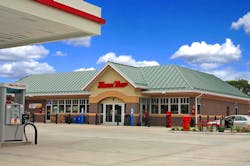With more than 18 million mi. of real-world experience and a built-in infrastructure that helped it quickly grow its natural gas fleet, Convenience Transportation, the wholly owned transportation subsidiary of the family-owned Kwik Trip convenience store chain, has been reaping benefits from the alternative fuel since 2012.
According to Joel Hirschboeck, superintendent of commercial and alternative fuels, the fleet of 109 alternative fuel vehicles (out of about 300 total vehicles), 8 of which are fueled by liquefied natural gas (LNG) and the rest with compressed natural gas, has displaced over 3.3 million gals. of diesel, saving about $2.6 million while doing “the same amount of work we would have done with diesel.”
The fuel systems were designed in collaboration with ANGI Energy
Systems.
“Our experience to date is consistent with our expectations,” Hirschboeck says. “We expected lower vehicle [cost per mile], and we have seen that to be true. We hoped for improved uptime, and we are seeing that as well.”
The transportation arm, which was formed in 1999 with the merger of Kwik Trip’s petroleum and grocery fleets, hauls bulk petroleum, bulk food grade, and dry van/multi-temperature loads in four states: Wisconsin, Minnesota, Iowa and Northern Illinois.
Initially equipped with 90 diesel gallon equivalent (DGE) rail-mounted tanks, the fleet’s first natural gas vehicles were sometimes forced to refuel at store locations due to range limitations. “This required us to fuel in route on 15% of our operation,” notes Hirschboeck. “Currently, we have transitioned to larger back-of-cab systems that hold around 120 [DGE], which has allowed us to effectively operate without the need to fuel on the road. However, having 32 store locations actively selling CNG and 40% of our fleet based in surrounding markets, we utilize many of the stations ourselves.”
Vehicles that return to the distribution center nightly fill up at the Kwik Trip Alternative Fuels fueling station located next door. The station is open to the public.
Tractor-trailers in the food distribution division make two turns a day, averaging about 495 mi. per day. There are 41 CNG and 12 LNG tractors in the division. The bulk petroleum division has multiple drivers sharing vehicles. Running a return-to-base operation, the fleet of 50 CNG tractors each travel about 525 mi. per day. There are also 11 natural gas straight trucks (1 LNG unit) in the food distribution division traveling about 275 mi. per day.
In tractor applications, the fleet is primarily operating Volvo VNL models with the Cummins Westport ISX G 12L engine. The straight trucks are a mix of makes powered by Cummins Westport ISL G 9L powerplants. Hirschboeck says the introduction of the ISX G 12L engine has significantly helped the operation and eliminated concerns over weight.
“Pulling capacity of heavy loads has not been an issue with our fleet,” he says. “That particular size engine is an exact match to the diesel platform we have been transitioning to. The overall weight of the equipment has risen some, but the benefits easily offset the increase.”
